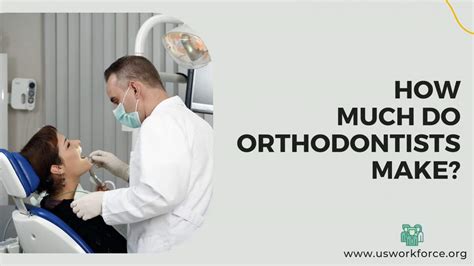Orthodontists are dental specialists who diagnose, prevent, and correct misaligned teeth and jaws. They use a variety of orthodontic appliances, such as braces and retainers, to straighten teeth and improve the alignment of the jaw. Orthodontists typically work in private practice, but some may also work in hospitals or clinics.

Education and Training Requirements
To become an orthodontist, you must first complete a bachelor’s degree, typically in biology or chemistry. After completing your bachelor’s degree, you must then complete dental school, which typically takes four years. After graduating from dental school, you must then complete a two- or three-year orthodontic residency program.
Average Salary
According to the Bureau of Labor Statistics, the median annual salary for orthodontists was $208,000 in May 2019. The lowest 10 percent of orthodontists earned less than $85,880, and the highest 10 percent earned more than $323,580.
Factors Affecting Salary
A number of factors can affect an orthodontist’s salary, including:
- Years of experience: Orthodontists with more years of experience typically earn higher salaries than those with less experience.
- Location: Orthodontists who work in urban areas typically earn higher salaries than those who work in rural areas.
- Practice setting: Orthodontists who work in private practice typically earn higher salaries than those who work in hospitals or clinics.
- Type of practice: Orthodontists who specialize in certain types of orthodontic treatment, such as Invisalign, typically earn higher salaries than those who do not.
Job Outlook
The job outlook for orthodontists is expected to be excellent over the next few years. The Bureau of Labor Statistics projects that employment of orthodontists will grow by 9 percent from 2019 to 2029, which is faster than the average for all occupations. This growth is expected to be driven by increasing demand for orthodontic services from an aging population.
Tips for Increasing Your Salary
There are a number of things you can do to increase your salary as an orthodontist, including:
- Gaining experience: The more experience you have, the more valuable you will be to potential employers. You can gain experience by working in a private practice, hospital, or clinic.
- Getting certified: There are a number of orthodontic certifications available, such as the American Board of Orthodontics (ABO) certification. Getting certified can demonstrate your commitment to your profession and increase your earning potential.
- Specializing in a certain type of orthodontic treatment: Orthodontists who specialize in certain types of orthodontic treatment, such as Invisalign, typically earn higher salaries than those who do not.
- Working in a high-paying area: Orthodontists who work in urban areas typically earn higher salaries than those who work in rural areas.
- Negotiating your salary: When negotiating your salary, be prepared to discuss your experience, skills, and accomplishments. You should also be prepared to negotiate for benefits, such as paid time off and health insurance.
Orthodontists are highly skilled professionals who earn a good salary. The job outlook for orthodontists is expected to be excellent over the next few years. If you are interested in a career as an orthodontist, there are a number of
